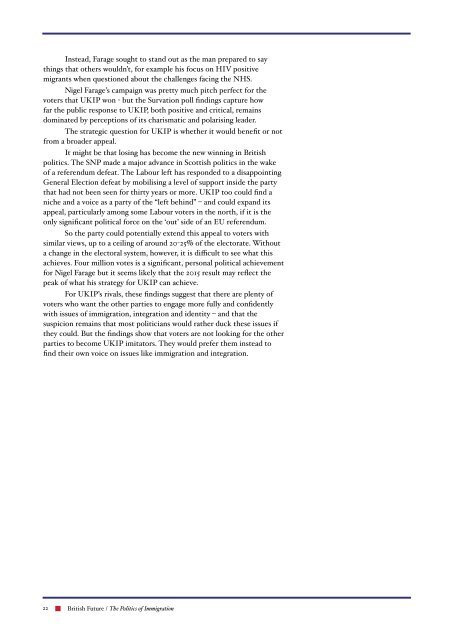THE POLITICS OF IMMIGRATION
The-politics-of-immigration
The-politics-of-immigration
Create successful ePaper yourself
Turn your PDF publications into a flip-book with our unique Google optimized e-Paper software.
Instead, Farage sought to stand out as the man prepared to say<br />
things that others wouldn’t, for example his focus on HIV positive<br />
migrants when questioned about the challenges facing the NHS.<br />
Nigel Farage’s campaign was pretty much pitch perfect for the<br />
voters that UKIP won - but the Survation poll findings capture how<br />
far the public response to UKIP, both positive and critical, remains<br />
dominated by perceptions of its charismatic and polarising leader.<br />
The strategic question for UKIP is whether it would benefit or not<br />
from a broader appeal.<br />
It might be that losing has become the new winning in British<br />
politics. The SNP made a major advance in Scottish politics in the wake<br />
of a referendum defeat. The Labour left has responded to a disappointing<br />
General Election defeat by mobilising a level of support inside the party<br />
that had not been seen for thirty years or more. UKIP too could find a<br />
niche and a voice as a party of the “left behind” – and could expand its<br />
appeal, particularly among some Labour voters in the north, if it is the<br />
only significant political force on the ‘out’ side of an EU referendum.<br />
So the party could potentially extend this appeal to voters with<br />
similar views, up to a ceiling of around 20-25% of the electorate. Without<br />
a change in the electoral system, however, it is difficult to see what this<br />
achieves. Four million votes is a significant, personal political achievement<br />
for Nigel Farage but it seems likely that the 2015 result may reflect the<br />
peak of what his strategy for UKIP can achieve.<br />
For UKIP’s rivals, these findings suggest that there are plenty of<br />
voters who want the other parties to engage more fully and confidently<br />
with issues of immigration, integration and identity – and that the<br />
suspicion remains that most politicians would rather duck these issues if<br />
they could. But the findings show that voters are not looking for the other<br />
parties to become UKIP imitators. They would prefer them instead to<br />
find their own voice on issues like immigration and integration.<br />
22 British Future / The Politics of Immigration


